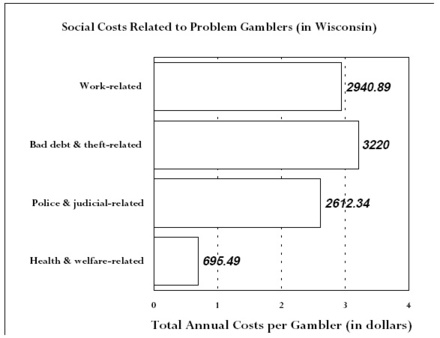The WAGER, Vol. 2(15) – Social costs of problem gambling
For policy makers to make informed gambling-related policy decisions, they must determine the potential costs and benefits. Thompson et al.* recently estimated the social costs of problem gambling specifically for Wisconsin. The social cost survey was completed by 98 members of Gamblers Anonymous during 1995. These gamblers were mostly white (96.9%) and male (72.4%) with an average history of 6.5 years of serious problem gambling. The social costs measured in this study included 1) employment-related costs (working hours lost due to gambling, unemployment compensation due to gambling, and foregone income due to unemployment), 2) bad debts & theft costs , 3) police and judicial-related social costs (bankruptcy, cost of civil cases, cost of criminal cases, cost of probation, cost of imprisonment, and cost of arrests), and 4) health & welfare-related social costs (treatment costs, food stamps, and AFDC). For each of these sub-categories, cost estimates were calculated on category-specific self-report data from the 98 GA members. The total annual cost of these four categories per gambler is $9,468.72. Based on the estimated lifetime problem gambling prevalence rate of 0.9% among Wisconsin adults, (which Thompson et al. suggest is most likely an underestimate), the annual total social costs for the entire state from the estimated 32,425 problem gamblers in Wisconsin is $307,023,246. This dollar amount reflects only the social costs associated with the four categories explored in this study. Additional categories of cost (e.g., lost opportunities) would increase the estimate. Including the social costs incurred by non-pathological gamblers would increase the estimate even more.
Source: *Thompson, W.N., Gazel, R., & Rickman, D. (1996). The social costs of gambling in Wisconsin. Wisconsin Policy Research Institute Report, 9(6), 1-44.
This public education project is funded, in part, by The Andrews Foundation.
